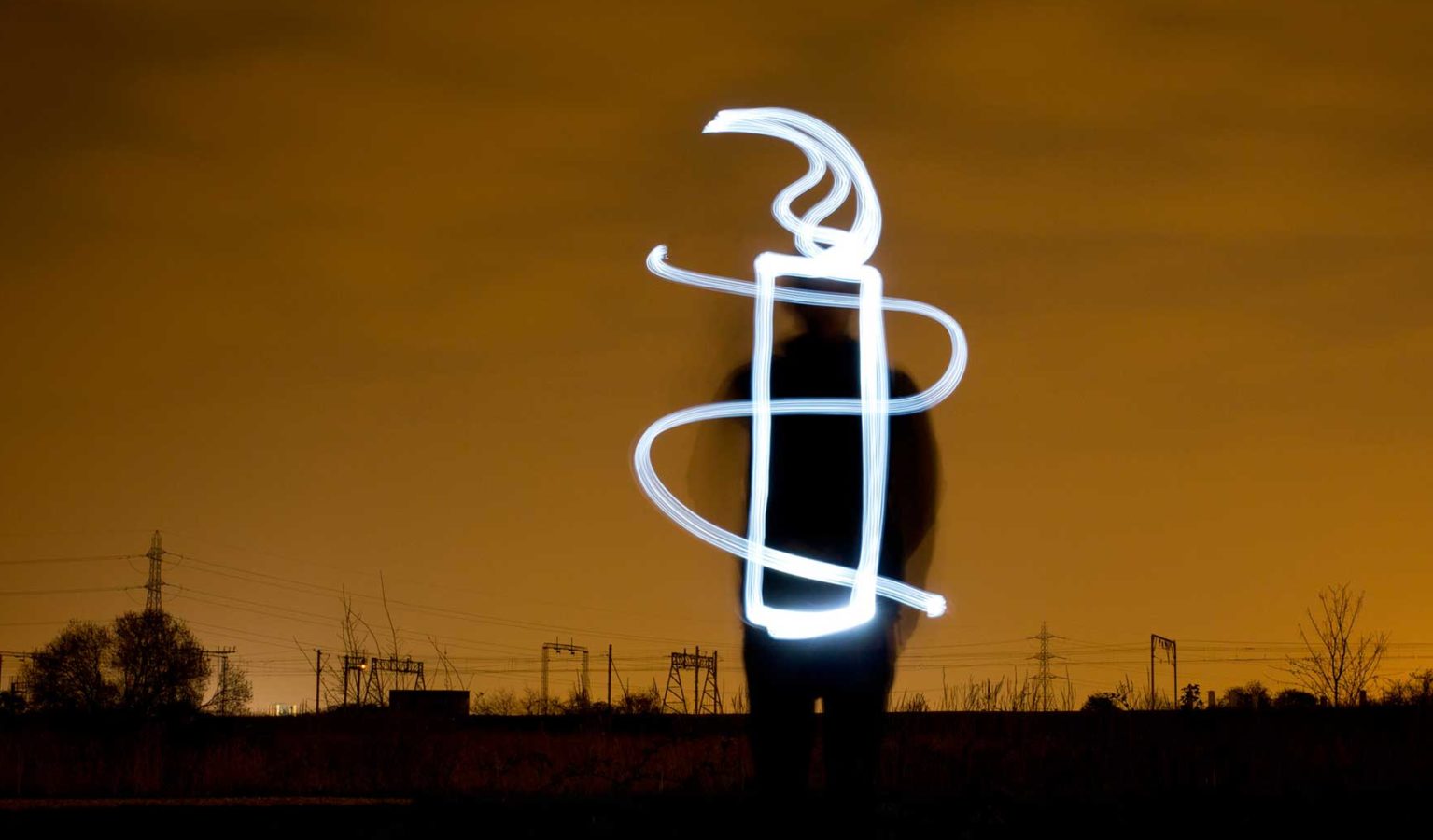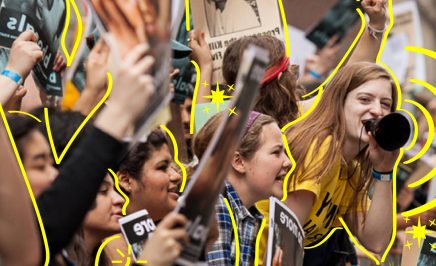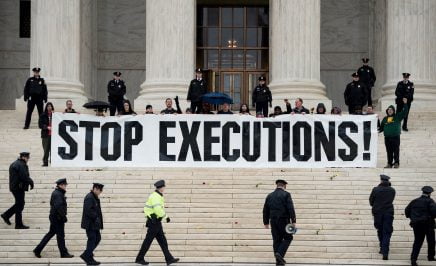In a hurry? Get five-minute and two-minute versions of this article here.
On 29 December 2023, the government of South Africa brought a case against Israel in the International Court of Justice (ICJ). It accused Israel of acts and failures to act that are genocidal in character and called for immediate provisional measures to protect the people of Gaza.
The ICJ heard South Africa and Israel’s arguments in early January. On 26 January, the ICJ issued an interim ruling ordering Israel to take steps to prevent acts of genocide.
The court ordered Israel to refrain from acts under the Genocide Convention, prevent and punish the direct and public incitement to genocide, and take immediate and effective measures to ensure the provision of humanitarian assistance to civilians in Gaza.
There’s plenty of confusion around the case: are rulings by the ICJ legally binding? What exactly is South Africa calling for? And what does it mean for countries like the US and Australia? On this page, we explain everything you need to know about the case so far.
What is the ICJ? Is it the same as the ICC?
The ICJ is the highest court of the United Nations (UN). It was established to rule on disputes between UN member states.
People sometimes confuse the ICJ with the International Criminal Court (ICC). While both courts adjudicate on matters of international law, they’re separate legal bodies with different purposes. The ICJ rules on disputes between member states. The ICC, meanwhile, investigates and tries individuals accused of genocide, war crimes, crimes against humanity, and the crime of aggression. As the ICJ only rules on the actions of states, it can’t apply rulings to armed groups like Hamas.
In 2021 the ICC opened an investigation into the situation in the State of Palestine. This Investigation covers crimes under international law committed by all parties including armed groups, as well as the crime against humanity of apartheid against Palestinians.
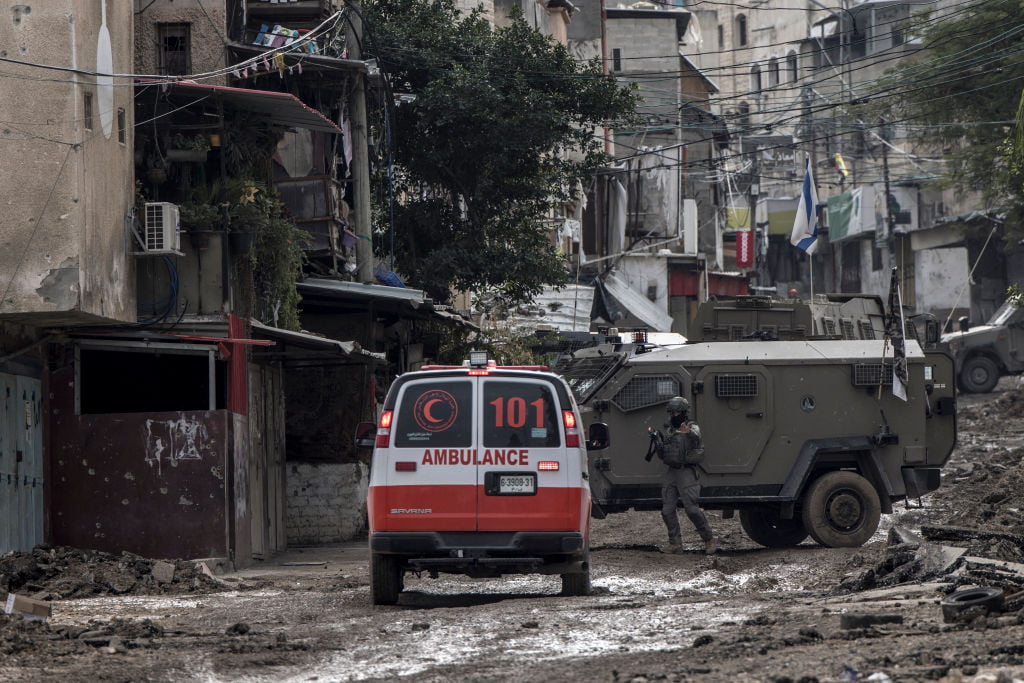
What has South Africa accused Israel of, and what’s it calling for?
In their application to the court, South Africa accused Israel of breaching its obligations under the Genocide Convention.
Genocide is a crime under the 1948 Genocide Convention, which defines which acts constitute genocide, and the Rome Statute, which allows the ICC to investigate and prosecute individuals accused of genocide. Under international law, all states have an obligation not to commit genocide.
South Africa brought the claim to the ICJ because both South African and Israel are signatories to the Genocide Convention. As part of the 26 January the ICJ determined it has jurisdiction to adjudicate that case.
Applying the Genocide Convention
The Genocide Convention prohibits specific acts committed with intent to destroy, in whole or in part, a national, ethnic, racial or religious group of people. Genocidal acts South Africa claims Israel has perpetrated against Palestinians in Gaza are:
- killing members of the group;
- causing serious bodily or mental harm to members of the group;
- deliberately inflicting on the group conditions of life calculated to bring about its physical destruction in whole or in part; and
- imposing measures intended to prevent births within the group;
Eventually, the ICJ will rule on whether Israel has violated the Genocide convention. But proving that Israel’s actions meet the strict legal criteria will be a long, difficult process.That decision could take years.
In the meantime, South Africa asked the ICJ to impose “provisional measures” on Israel. These measures are meant to prevent acts of genocide before the court arrives at a final decision. They’re designed to ease the immediate suffering of people in Gaza afflicted by the IDF’s brutal campaign.
How South Africa used Amnesty International’s work to support its case.
South Africa’s ICJ application cites evidence gathered by Amnesty International documenting damning evidence of war crimes and other violations of international law by Israeli forces in their intense bombardment of Gaza. This includes direct attacks on civilians and civilian objects, indiscriminate and other unlawful attacks, forced displacement of civilians and collective punishment of the civilian population. It also cites research by Amnesty International highlighting that Israel’s system of domination and oppression of Palestinians amounts to apartheid, a crime against humanity.
What ruling did the ICJ make?
The ICJ made an interim ruling ordering Israel to take provisional measures to prevent genocide. It found that some of South Africa’s allegations were plausible and could constitute violations of the Genocide Convention.
The court ordered Israel to take six provisional measures to prevent genocidal acts. These included:
- Preventing and punishing incitement to genocide
- Ensuring aid and services reach Palestinians under siege in Gaza
- Preserving evidence of crimes committed in Gaza
The ICJ also gave Israel one month to submit a report detailing how it’s meeting these provisional measures.
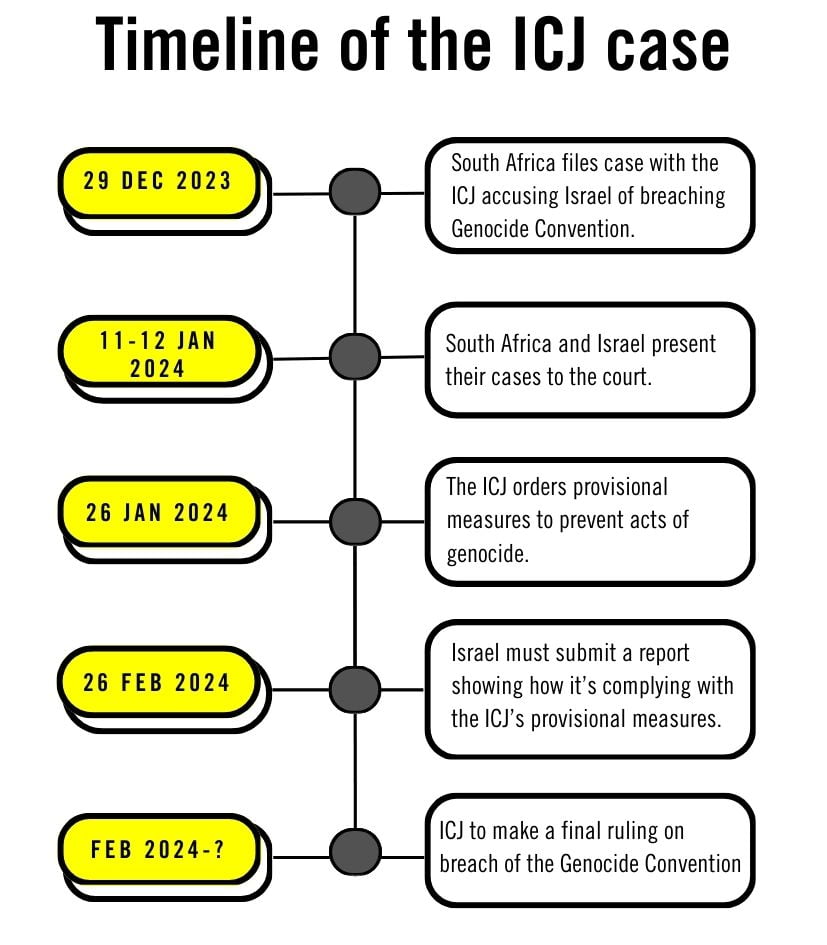
Are ICJ rulings legally binding?
There’s some confusion about whether or not the ICJ’s rulings are legally binding.
The ICJ’s rulings are legally binding. Decisions are final, and member states can’t appeal them. But enforcing those rulings can be challenging, as the court relies on the United Nations Security Council to do this.
What does the ruling mean for Israel and the people of Gaza?
All states have an international legal obligation to act to prevent genocide under the Genocide Convention. The obligation to prevent is binding on all states, including states that aren’t party to the Convention. Australia is a signatory to the Convention and has an obligation to do everything in its power to prevent genocide. States also have a clear duty to ensure the provisional measures ordered by the Court are implemented.
Countries like the USA, Australia, and many EU states that are allies of Israel must take action and signal their respect for the Court’s legally binding decision. They must do everything in their power to uphold their obligation to prevent genocide, and ensure the provisional measures are implemented. Failure to do so would be a grave blow to credibility and trust in the international order.
The US has been Israel’s most important ally, both politically and in material support for its military campaign. Amnesty International has verified that Israel used US weapons in indiscriminate or targeted attacks against Palestinian civilians. President Joe Biden twice bypassed congress to supply military equipment to Israel.
Glossary of key terms
Genocide
Genocide is a crime under the 1948 Genocide Convention and the 1998 Rome Statute. This is how it’s defined in Article II of the Genocide Convention:
“In the present Convention, genocide means any of the following acts committed with intent to destroy, in whole or in part, a national, ethnical, racial or religious group, as such:
- Killing members of the group;
- Causing serious bodily or mental harm to members of the group;
- Deliberately inflicting on the group conditions of life calculated to bring about its physical destruction in whole or in part;
- Imposing measures intended to prevent births within the group;
- Forcibly transferring children of the group to another group.”
Occupation
Occupation refers to the act of occupying an area through military force. Israel’s occupation of the Palestinian Territories involves ruthless policies of land confiscation, illegal settlement and dispossession, coupled with rampant discrimination, that has inflicted immense suffering on Palestinians, depriving them of their basic rights.
Gaza Strip
The Occupied Gaza strip is a narrow strip of land between Israel and Egypt, where approximately two million Palestinians reside. It’s one of the most densely populated areas in the world, with an area of approximately 45 km squared. It’s currently subject to thousands of air and ground strikes on the Gaza Strip as launched by Israeli forces. According to the UN, about 100,000 people have been killed, injured or are missing presumed dead since the beginning of Israel’s campaign. Most of them are women and children.
Ceasefire
A ceasefire refers to the suspension of the continuation of any attacks. A ceasefire would put a stop to unlawful attacks by all parties, halt the mounting death toll in Gaza and enable aid agencies to get life-saving aid, water and medical supplies into the Strip to address the staggering levels of human suffering. It will also allow hospitals to receive life-saving medicines, fuel and equipment they desperately need and to repair damaged wards.
International Humanitarian Law
International humanitarian law (IHL) is a set of international laws that set out what can and cannot be done during an armed conflict. The main purpose of IHL rules is to maintain humanity in armed conflicts, specifically the lives and rights of innocent civilians.
Crimes Against Humanity
As established under the Rome Statute, ‘crimes against humanity’ refers to any acts when committed as part of a widespread or systematic attack directed against any civilian population, with knowledge of the attack, including mass extermination, apartheid, deportation and forced transfer and persecution.
War Crimes
War crimes are any acts carried out in war that constitute a violation against international humanitarian law. Amnesty has documented many war crimes committed by Israel against Palestinians. Israel’s blockade of Gaza, imposed since 2007 constitutes the war crime of collective punishment of the civilian population. During this conflict and past military offensives in Gaza, Israel has committed war crimes. They include direct attacks on civilians and civilian objects, indiscriminate and disproportionate attacks, killing and injuring thousands of civilians.
Amnesty International has also documented war crimes committed by Palestinian armed groups in repeated cycles of violence in recent years. These include mass summary killings, deliberate killings of civilians, and civilian hostage-taking on 7 October, and the continued launching of indiscriminate rocket attacks into Israel.
All those responsible for war crimes must be held accountable by independent investigations, including by the ICC.
What are Australia’s responsibilities following the ICJ ruling?
The Australian government was slow to react as evidence of Israeli war crimes in Gaza mounted. They took a stronger stance following nationwide protests led by Palestinians, and advocacy by Amnesty supporters and tens of thousands of Australians.
Australia has since supported a ceasefire at the UN General Assembly, and Foreign Minister Wong called for a ceasefire during a recent trip to the region. But there are some areas where Australia’s failing to do everything in its power to prevent genocide, and to ensure Israel implements the ICJ’s provisional measures. One of these is the approval of exports of military goods to Israel.
Another issue is Australia’s recent suspension of funding for aid to Palestinians in Gaza. Only days after the ICJ ruling, Australia was among several major donor countries that paused funding to the UNRWA after 12 of its 30,000 staff were accused of involvement in the 7 October attack. These allegations are serious and must be independently investigated. But the alleged actions of a few individuals must not be used as a pretext for cutting off life-saving assistance in what could amount to collective punishment.
This decision will cause further suffering to two million Palestinians who are facing the risk of genocide.
The decision to cut off aid contradicts the ICJ’s ruling that Israel must ensure the provision of humanitarian assistance to Palestinian civilians in Gaza as a step to prevent genocide. To comply with the ICJ ruling, and take steps to prevent genocide, Australia must reverse its decision to suspend funding to UNRWA.
Amnesty is calling on states to take urgent steps to prevent ongoing international crimes, including by imposing a comprehensive arms embargo against Israel and Palestinian armed groups. Australia must stop approving the export of military goods to Israel.
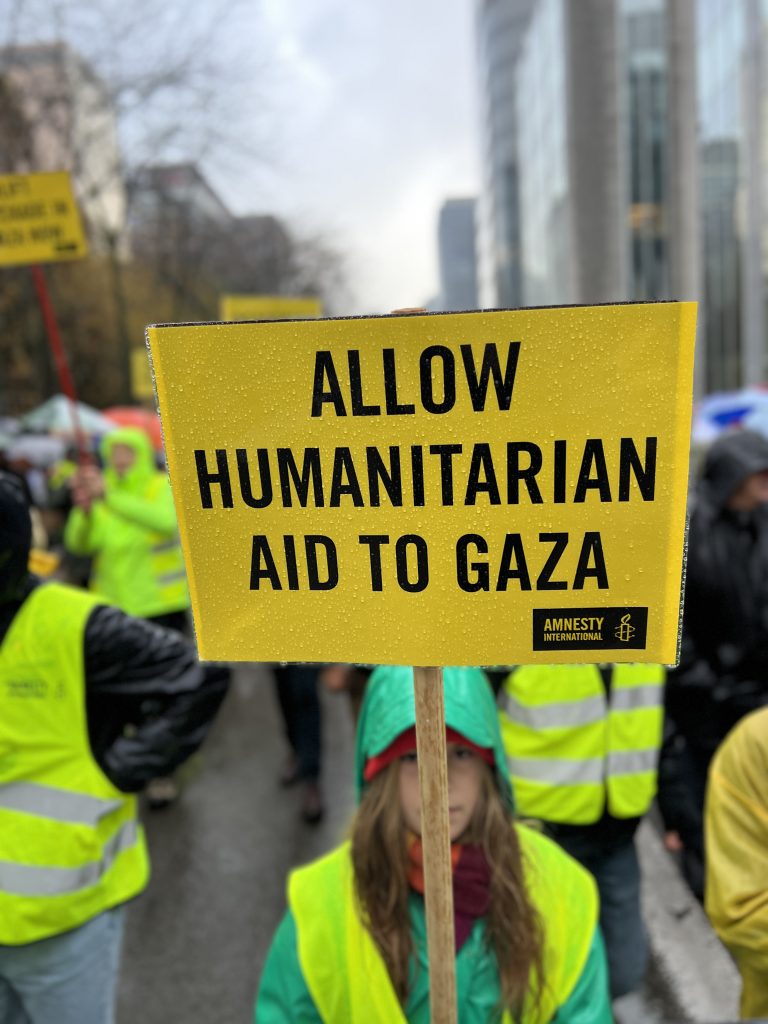
What happens next?
The ICJ ordered that Israel report back on the steps it’s taking to comply with the provisional measures within one month. Israel has a history of ignoring UN directives, and various statements and actions by Israeli authorities since the ruling suggest it plans on doing exactly that.
But the evidence of war crimes is piling up and millions around the world have raised their voices in outrage and horror. With grave concerns for regional stability, widespread public condemnation and now the ICJ considering whether Israel has violated the Genocide Convention, states, including Israel’s allies, must take action.
We must send a clear message that Australia and the world will not stand by in silence. As Israel pursues a ruthless military campaign to decimate the population of the Gaza Strip and unleash unprecedented death suffering against Palestinians, we must act.
Two million civilians in Gaza won’t survive without aid.
The situation for the people of Gaza is desperate. Famine is looming. Disease is spreading. Mothers are losing access to clean water and baby formula. UNRWA’s commissioner general says the lifeline to Gaza could “collapse any time now”.
Join Amnesty in sending a message to Penny Wong to demand the Australian Government reverse its decision to suspend funding to UNRWA. It’s a decision that threatens the lives of the two million civilians in Gaza dependent on the region’s largest aid provider for their daily survival as they face relentless bombardment, death and destruction.
Short on time? Get the condensed article here.
Click here to read the five-minute version.
On 29 December 2023, the government of South Africa brought a case against Israel in the International Court of Justice (ICJ). It accused Israel of acts and failures to act that are genocidal in character, and called for immediate provisional measures to protect the people of Gaza.
The ICJ heard South Africa and Israel’s arguments in early January. On 26 January, the ICJ issued an interim ruling ordering Israel to take steps to prevent acts of genocide.
The court ordered Israel to refrain from acts under the Genocide Convention, prevent and punish the direct and public incitement to genocide, and take immediate and effective measures to ensure the provision of humanitarian assistance to civilians in Gaza.
There’s plenty of confusion around the case: are rulings by the ICJ legally binding? What exactly is South Africa calling for? And what does it mean for countries like the US and Australia? On this page, we explain everything you need to know about the case so far.
What is the International Court of Justice (ICJ)? Is it the same as the International Criminal Court (ICC)?
The ICJ is the highest court of the United Nations (UN). It was established to rule on disputes between UN member states.
While both courts adjudicate on matters of international law, they’re separate legal bodies with different purposes. The ICJ rules on disputes between member states. The ICC, meanwhile, investigates and tries individuals accused of genocide, war crimes, crimes against humanity, and the crime of aggression.
What has South Africa accused Israel of, and what’s it calling for?
South Africa accused Israel of breaching its obligations under the Genocide Convention by the following acts against Palestinians in Gaza:
- killing members of the group;
- causing serious bodily or mental harm to members of the group;
- deliberately inflicting on the group conditions of life calculated to bring about its physical destruction in whole or in part; and
- imposing measures intended to prevent births within the group;
As the decision process of the ICJ could take years, South Africa also calls on the ICJ to impose “provisional measures” to prevent acts of genocide and ease the suffering of Palestinians in the meantime.
What ruling did the ICJ make?
An interim ruling by the ICJ found that some of the Israel’s actions could constitute violations of the Genocide Convention. It ordered Israel to take six provisional measures to prevent genocidal acts, including:
- Preventing and punishing incitement to genocide
- Ensuring aid and services reach Palestinians under siege in Gaza
- Preserving evidence of crimes committed in Gaza
The ICJ also gave Israel one month to submit a report detailing how it’s meeting these provisional measures.
Are ICJ rulings legally binding?
The ICJ’s rulings are legally binding. Decisions are final, and member states can’t appeal them. However, the court relies on the United Nations Security Council to enforce its rulings.
What does the ruling mean for Israel and the people of Gaza?
The ICJ’s ruling is an important step for the protection of Palestinian lives, to restore trust in the universal application of international law, and to pave the way for justice and reparation for victims. However, so far, Israel has continued its military campaign and hasn’t taken any visible steps to comply with the ICJ’s ruling.
What does the ICJ case mean for countries that have supported Israel?
All states have an international legal obligation to act to prevent genocide under the Genocide Convention. The obligation to prevent is binding on all states, including states that aren’t party to the Convention. Australia is a signatory to the Convention, and has an obligation to do everything in its power to prevent genocide.
Countries like the USA, Australia, and many EU states that are allies of Israel must do everything in their power to prevent genocide and ensure the provisional measures are implemented. Failure to do so would be a grave blow to credibility and trust in the international order.
What are Australia’s responsibilities following the ICJ ruling?
Australia has supported a ceasefire at the UN General Assembly and during a recent trip to the region. But there are some areas where Australia’s failing to do everything in it’s power to prevent genocide. One of these is the approval of exports of military goods to Israel. Another is the recent suspension of funding for aid to Palestinians in Gaza.
What happens next?.
The ICJ ordered that Israel report back on the steps it’s taking to comply with the provisional measures within one month. Israel has a history of ignoring UN directives, and various statements and actions by Israeli authorities since the ruling suggest it plans on doing exactly that.
But the evidence of war crimes is piling up and millions around the world have raised their voices in outrage and horror. We must send a clear message that Australia and the world will not stand by as Israel pursues a ruthless military campaign to decimate the population of the Gaza Strip.
Two million civilians in Gaza won’t survive without aid
The situation for the people of Gaza is desperate. Famine is looming. Disease is spreading. UNRWA’s commissioner general says the lifeline to Gaza could “collapse any time now”.
Join Amnesty in sending a message to Penny Wong to demand the Australian Government reverse its decision to suspend funding to UNRWA. It’s a decision that threatens the lives of the two million civilians in Gaza dependent on the region’s largest aid provider for their daily survival as they face relentless bombardment, death and destruction.
Click here to read the two-minute version.
On 29 December 2023, the government of South Africa brought a case against Israel in the International Court of Justice (ICJ). It accused Israel of acts and failures to act that are genocidal in character, and called for immediate provisional measures to protect the people of Gaza.
The ICJ heard South Africa and Israel’s arguments in early January. On 26 January, the ICJ issued an interim ruling ordering Israel to take steps to prevent acts of genocide.
What is the International Court of Justice (ICJ)?
The ICJ is the highest court of the United Nations (UN). It was established to rule on disputes between UN member states.
What has South Africa accused Israel of, and what’s it calling for?
South Africa accused Israel of breaching its obligations under the Genocide Convention by the following acts against Palestinians in Gaza:
- killing members of the group;
- causing serious bodily or mental harm to members of the group;
- deliberately inflicting on the group conditions of life calculated to bring about its physical destruction in whole or in part; and
- imposing measures intended to prevent births within the group;
South Africa also called on the ICJ to impose “provisional measures” to prevent acts of genocide and ease the suffering of Palestinians
What ruling did the ICJ make? Is it legally binding?
The ICJ’s interim ruling found it was plausible that some of Israel’s actions may have violated the Genocide Convention. It ordered Israel to take provisional measures, including:
- Preventing and punishing incitement to genocide
- Ensuring aid and services reach Palestinians under siege in Gaza
- Preserving evidence of crimes committed in Gaza
The ICJ’s rulings are legally binding. However, enforcing them can be challenging.
The ICJ also ordered Israel report back on how it’s meeting these provisional measures within one
What does the ruling mean for Israel and the people of Gaza?
The ICJ’s ruling is an important step for the protection of Palestinian lives and to pave the way for justice. However, so far, Israel hasn’t taken any visible steps to comply.
What does the ICJ case mean for countries that have supported Israel?
Countries like the USA, Australia, and many EU states must do everything in their power to prevent genocide and ensure the provisional measures are implemented.
What are Australia’s responsibilities following the ICJ ruling?
Australia has supported a ceasefire, but there are some areas where it’s failing to do everything in it’s power to prevent genocide. One of these is the approval of exports of military goods to Israel. Another is the recent suspension of funding for aid to Palestinians in Gaza.
What happens next?
The ICJ ordered that Israel report back on the steps it’s taking to comply with the provisional measures within one month.
We must send a clear message that Australia and the world won’t stand by as Israel ruthlessly decimates the population of the Gaza Strip.
Two million civilians in Gaza won’t survive without aid
The situation in Gaza is desperate. The UNRWA’s commissioner general says the lifeline to Gaza could “collapse any time now”.
Join Amnesty in sending a message to the Australian Government to demand it reverse its decision to suspend funding to UNRWA. It’s a decision that threatens the lives of the two million civilians in Gaza dependent on the region’s largest aid provider for their daily survival.
